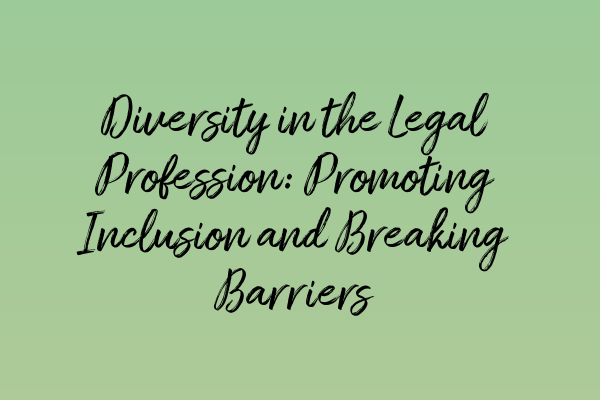Diversity in the Legal Profession: Promoting Inclusion and Breaking Barriers
When we think of the legal profession, the image that often comes to mind is one of white, male lawyers in traditional suits and ties. However, the legal landscape is changing, and the need for diversity and inclusion in the legal profession has become more important than ever. In this blog post, we will explore the importance of diversity in the legal profession, the barriers that exist, and the steps being taken to promote inclusion.
Why Diversity Matters
Diversity in the legal profession is not just about meeting quotas or checking boxes. It is about creating a legal system that is representative of the society it serves. When the legal profession is diverse, it brings different perspectives, experiences, and ideas to the table. This diversity can lead to more innovative and effective solutions to legal problems.
Furthermore, diversity in the legal profession is essential for promoting access to justice. People from different backgrounds and communities are more likely to trust and engage with legal professionals who understand their unique challenges and can provide culturally competent legal advice.
Barriers to Diversity
While progress has been made, there are still significant barriers that prevent diversity in the legal profession. One major barrier is the lack of access to education and opportunities. Historically, certain groups have faced systemic barriers that make it harder for them to pursue a legal career, such as limited access to quality education or networking opportunities.
Another barrier is unconscious bias. Unconscious bias refers to the biases and stereotypes that we hold without even realizing it. These biases can affect recruitment and promotion decisions, making it harder for underrepresented groups to succeed in the legal profession.
Additionally, the legal profession has long-held traditions and practices that can be exclusionary. For example, the billable hour model can create barriers for lawyers who need more flexibility or have caregiving responsibilities.
Promoting Inclusion
To promote diversity in the legal profession, it is crucial to address these barriers and create a more inclusive environment. One way to do this is by implementing targeted recruitment and retention strategies. Law firms and legal organizations can actively seek out candidates from diverse backgrounds and provide support and mentorship programs to help them thrive.
Another important step is raising awareness about unconscious bias and providing training to help professionals recognize and challenge their biases. By creating a more inclusive and equitable workplace culture, firms can foster an environment that values diversity and promotes equal opportunities for all.
Furthermore, the legal profession should strive to make legal education more accessible. This can be done by providing scholarships and financial assistance to students from underrepresented backgrounds, as well as partnering with organizations that promote diversity and inclusion in the legal field.
Conclusion
Promoting diversity in the legal profession is not just a buzzword – it is a necessary step towards creating a legal system that truly represents and serves the needs of all members of society. By breaking down barriers, raising awareness about unconscious bias, and implementing inclusive practices, we can create a legal profession that is diverse, inclusive, and ultimately better equipped to address the complex legal challenges of our time.
Related Articles:
- Private Prosecutions: Exploring Non-Governmental Prosecutions in Criminal Cases
- Understanding Drug-related Offences: Laws and Penalties in the UK
- Criminal Defence Strategies: Expert Approaches to Protecting Clients’ Interests
- Demystifying Criminal Law Procedures: A Step-by-Step Guide
- Rights of the Accused: Protecting Individual Liberties in Criminal Proceedings


Leave a Reply